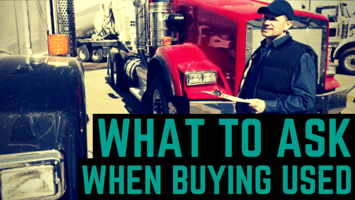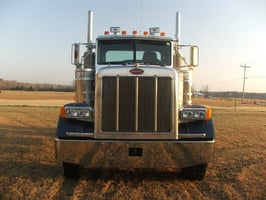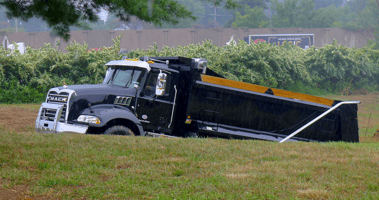By now you’ve decided to go with a used commercial truck to maintain your fleet. But before you say...
The Ultimate Guide to Buying a Used Truck
Purchasing a used truck from a private seller requires that you know what you’re doing and follow some crucial guidelines.
For nearly 38 years we have purchased thousands of used trucks and based on our experience and the experience of our customers, we've put together a guide to help you find the best equipment at a great price that will serve your company for years to come. Here’s everything you need to know.
Why Buy Used
You might be questioning whether it makes more sense to purchase your truck new. After all, you’ll be using it for years to come in your business. A quality used truck can save you up to 40% while still providing many years of outstanding service.
Consider the scenario of a new vs used tri-axle dump truck. You could go out and buy a brand new tri-axle 2024 T880 for $275,000 or buy a 2019 T880 for $165,000. The new truck will cost you almost $155,000 more after you are done financing it and you’ll make payments on it for a year and a half longer than you would with the used truck.
Additionally, the used truck’s payment will be $700-$1,200 less per month than the new truck depending on the age, down payment and the length of the term on the loan you select.
With a good used buying strategy, you’ll remove the initial depreciation expense that vehicles experience the moment you drive them off the lot while expanding your fleet or replacing worn-out equipment that your business can no longer rely on.
Buying used isn’t for everyone. You shouldn’t consider it if you are:
- Not a hands-on operator
- Don't have a quality mechanic you can rely on
- Run 15+ trucks and you know how to cycle your fleet.
Finance vs. Pay Cash
Some truck buyers view cash as the only way to buy a used truck. But savvy operators know how to look at the whole picture. Here’s a look at some reasons to finance a used truck.
Get More Truck
When shopping as a cash buyer, the amount of cash you have on hand will limit you, which usually means getting a cheaper, less reliable used truck. It could be the difference between getting a $70,000 dump truck that could have a host of mechanical issues or getting a $100,000 truck that might need some minor work but will stay on the road longer letting you earn more money.
Cash Flow
If you have $70,000 saved and use it to buy a used truck only to learn that it needs a clutch job for $3,000 you are stuck with few options and could have cash flow issues.
However, if you put down $40,000 on a $100,000 truck and finance the rest, you will be able to not only buy a more reliable truck but also have a $30,000 cushion for any unforeseen expenses and registration. You will still walk away with a manageable monthly payment you can generate a healthy profit from, but you won’t be stressed about what happens if the truck needs to go to the shop.
Timing
Many operators who pay cash and are replacing a unit need to sell their old truck before they can shop for a used truck. This means having to sell their truck fast and getting less for it. When you finance the purchase, you can leverage the financing company’s money so you sell your old truck for top dollar and don’t have to stress about coming up with the funds when you find the right truck
Keep in mind, it doesn’t always make sense to finance a used truck. For example, a truck that is more than 25 years old or a truck worth less than $25,000 might make more sense to purchase with cash.
Types of Lenders
When financing the purchase of a used truck, it's essential to find a lender that not only understands the type of truck you're buying but also offers favorable terms.
Factors such as the cost of borrowing, the ability to finance the vehicle, and the speed of approval play crucial roles in your decision-making process. After all, an approval at a super low rate isn't beneficial if the truck you're eyeing gets sold to another buyer whose bank acted faster.
Let’s explore the 3 main ways to finance a used truck.
Traditional Banks
Buyers often like going directly to their commercial banking partner because they already have a working relationship. Here’s a look at the benefits and drawbacks of using a traditional bank.
- Benefits: Typically offer the best interest rates, especially for existing customers.
- Drawbacks: Can be rigid in their approval process, limiting your truck options. They might also take multiple weeks to grant an approval leaving you searching for another truck.
Dealership Financing
If you’re purchasing from an individual, this is not an option. But if you do go through a dealership, you can complete the financing and purchasing process all at once. Just make sure dealership financing fits your use case based on these benefits and drawbacks.
- Benefits: Offers convenience with a one-stop-shop experience, especially if you've already chosen a truck from their inventory.
- Drawbacks: Dealerships don't make the final approval; instead, they work with third-party lenders. This means you might end up paying a premium compared to private lenders, and your credit might be checked by multiple finance companies. You are also locked into their available inventory and not the open market.
Independent Finance Companies
When you have the time and preparation to get pre-approved with an independent finance company, it often offers the best rates and terms. But you will need to do it before you head to the dealership, which means setting aside time before you start truck shopping. Know the benefits and drawbacks this option entails.
- Benefits: Provide competitive terms and understand the value of used trucks and equipment. Because they are independent, you’ll have the ability to shop at a dealer or private seller. They can also approve and finance your truck within a couple of days.
- Drawbacks: Their terms might not be as aggressive as traditional banks. And some are brokers, which means the person/company you are initially dealing with may not be the person servicing the account.
Typical Process to Finance A Used Truck
Before you start shopping for a used truck, you should obtain financing pre-approval. This will allow you to buy confidently and show sellers that you’re not just kicking tires. It gives you greater negotiating power and ensures you secure the best rates.
When financing a used truck, here’s what you can expect and the documents you’ll need to prepare for the process.
1. Determine your budget for a down payment
Your down payment amount can help you determine your budget for a used truck. Purchasing trucking equipment can cost hundreds of thousands of dollars, even when buying used. That means that most trucks will require at least a $20,000 down payment, which is 20% of a $100,000 truck. But you’ll also need cash for the taxes, registration and fees. Talk with your lender about no-money-down options if you’re currently cash-strapped. Just know that those loans are reserved for businesses with outstanding credit.
2. Gather the necessary paperwork
When applying for a loan, you'll typically need to provide documentation, such as three months of bank statements, your most recent tax return, and a credit application. Lenders look at these documents to ensure that the information on your application aligns with your bank deposits and tax returns. While minor discrepancies are common, be prepared to explain any major inconsistencies.
3. Shop for your truck
With pre-approval, you can shop confidently for your next truck. Sellers will take you seriously and you can close the deal the same day you find the truck because you’ve done all the prework. Stay in contact with your lender throughout the shopping process to ensure they’ll be ready for you once you find the truck you want to buy.
Used Truck Inspection Checklist
The key to finding great used trucks on the market is to complete a thorough inspection. If the vehicle has issues, you want to know about them before you sign on the line to give you more negotiating power and insight as to what the maintenance will cost you long term. These are the paces you should put a used truck through.
1. Check brakes
Worn lining, cracked linings and rust jacking are some of the biggest concerns when checking brakes. Rust jacking is most often identified by a layer of rust between the drum brake shoe table and the friction material. The brake shoe cannot be repaired and must be replaced.
2. Measure tire tread depth
The FMCSA requires that vehicles have a tire tread depth of at least 4/32 on every major groove on the front wheels and at least 2/32 on all other tires. Not only will this tell you the life left in the tires, but it will also tell you how well the truck was cared for. If the tire has excessive wear in the center of the tread, it was likely over-inflated. Tires with heavier wear on the shoulders could have been underinflated. When a truck’s tires show major irregular wear, it can indicate an alignment issue. And knobby treads might tell you that there is a toe-in value problem.
3. Check the fluids
All trucks leak to some extent. Check the oil, coolant, transmission fluid, brake fluid and power steering fluid. Minor leaks are often not a concern but you’re looking for low levels that would indicate problems between fluid changes.
4. Use a scan tool to check engine fault codes
Pay attention to any prior overheat codes or low oil pressure codes (even if Inactive these will usually remain in the ECM memory permanently).
5. Review suspension
Inspect the suspension components, including springs, shocks, and bushings, for signs of wear or damage. Check for any visible cracks, bends, or weak points on the chassis frame, as this can affect the truck's stability and load-bearing capacity.
6. Check the exterior body and frame
Check for any signs of rust, corrosion, or extensive damage on the body and frame. Look for dents, scratches, or evidence of past repairs, which may indicate accidents or harsh usage. If equipped with a body, Ensure that the hydraulic components are in good working order, with no leaks or structural issues.
7. Bring a mechanic
You’ll likely find problems with a used truck. No truck will be perfect. But bringing a mechanic with you enables you to get an estimate for what the problems might cost you. That way, you’re making an informed decision about what the truck will cost to get on the road and not just the upfront cost of the vehicle from the seller.
Red Flags When Buying a Used Truck
Even with the best inspection and clean bill of health from your mechanic, a truck might still have issues you want to steer clear of. Some of the issues you’ll want to be aware of and avoid include the following.
Jumping Title
When an owner purchases a new vehicle but never transfers the title to their name before reselling it, that is known as title jumping. The practice is illegal. While it isn’t illegal for you to buy a vehicle with title jumping, it can cause you headaches when proving ownership or getting the vehicle serviced. It’s best to resolve the jumping title before buying or just keep looking for another truck.
Low Miles
You might think you’ve found a dream when you find a used truck with low miles. And maybe you have but before you get excited, check the engine hours. If it seems like there’s a tale of two trucks when comparing miles and engine hours, move on. Something isn’t on the up and up with this truck. A good rule of them is 1 engine hour = 25 miles of equivalent wear.
Deleted Trucks
This is a tactic where truck owners remove parts of the truck emissions. It is done by physical removing emission control components and reprogramming the trucks computer to increase performance but also increase the pollutants the truck puts out. While many find these trucks desirable they will be nearly impossible to finance and come with hefty fines. Trucks with deleted emissions are illegal and the cost to return these trucks to their compliant state will take some funds. It’s best to avoid them to stay in complete compliance.
Engine overhaul without paperwork
Some sellers try to make some simple maintenance or minor parts upgrades out to be a full engine overhaul. If the seller doesn’t have paperwork for the overhaul, it might signal that something is up. You want to see who did the overhaul. Ideally, it was done with a licensed mechanic or by the dealer. Check to make sure that the VIN of the truck is on the paperwork along with the engine serial number.
Get Pre-approved for Your Purchase
If you’re ready to buy your used truck, get your pre-approval now to ensure a smooth buying process. Call 973-403-7788 to talk with the Intek Truck Equipment Leasing & Financing team.



